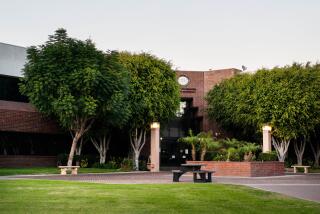Realtor to Give $1.62 Million for UCI Chair : Endowment: Louise Turner Arnold has pledged the proceeds from the sale of an oceanfront property to establish a research position in neurosciences.
- Share via
IRVINE — In a move that creates the richest endowed chair ever at UC Irvine, a Laguna Beach realtor has pledged $1.62 million to create a position for a researcher who would study the effects of aging on the brain.
Louise Turner Arnold, president and owner of Turner Associates, a Laguna Beach real estate firm, has pledged to UCI the proceeds from the sale of an oceanfront property. The money will establish a chair in neurosciences, a field in which UCI has drawn national attention.
“We are extremely pleased at the generosity of Mrs. Arnold,” said Dr. Walter L. Henry, vice chancellor of health sciences and dean of UCI’s College of Medicine. “We are convinced the chair will be very important in enhancing our already recognized national reputation in the field of neuroscience.”
Arnold, who has been active in fund raising for UCI for 20 years, said she hopes the newly endowed chair might unlock secrets of aging that could improve the quality of life for senior citizens struggling with ailments such as Alzheimer’s and Parkinson’s diseases.
She said she knows personally the pain of watching aging loved ones suffer memory loss and other mental impairments.
“It’s demoralizing to watch when someone has been active and bright, and then you see them deteriorating,” she said. “I hope we can find some way to save others in the future from pain like that.”
The endowment money will come from the sale of a 13,000-square-foot vacant lot in the gated Laguna Beach community of Three Arch Bay, a parcel that has been appraised at $1.62 million, she said.
James L. McGaugh, director of UCI’s Bonney Center for the Neurobiology of Learning and Memory, called Arnold’s gift “a mark of distinction in every conceivable way.”
An endowed chair is a “prized possession” which is powerful in attracting top-notch faculty or recognizing talent of the existing faculty, McGaugh said. And the value of the money as applied to research, he said, can hardly be overstated.
“Money of this magnitude is, well, what can I say?” McGaugh said Tuesday. “We will be able to do wonderful things with it.”
McGaugh said the money will be used to fund research into the nature of memory disorders and the brain mechanisms underlying memory, an inquiry that hopefully will lead to prevention of afflictions which are common among the aged.
“In my view, there is no greater disability than to lose the ability to learn and remember,” he said. “That fundamentally is what makes us human.”
Before Arnold’s commitment, the richest endowed chair in the university’s 27-year history was created in 1986 by the FHP Foundation. That $1-million chair, established in the Graduate School of Management, focuses on health care management.
The university has a total of 18 endowed chairs, in topics ranging from ophthalmology and Jewish history to the rehabilitation of victims of spinal cord and head injuries. Of the 18 chairs, eight are currently unfilled. Arnold’s gift will create UCI’s 19th endowed chair.
In 1989, real estate developer Donald Bren created the Bren Fellows Program with $1.5 million, soon adding another $1 million for a second slot in that program.
Arnold has been active in UCI fund-raising circles for many years, as director of the UCI Foundation and a member of the Chancellor’s Club and the Founder’s Circle of the College of Medicine. She also is a member of Human Options, a Newport Beach-based group that runs support groups and shelters for abused women. She is married and has two grown daughters.
Unlike many private universities, the University of California uses the money from endowed chairs only to support research, not to pay the salaries of those appointed to the chairs, McGaugh said.
A search committee must now be appointed to identify candidates for the Arnold chair, according to university policy and procedures. After review by various committees and UCI officials, the final decision lies with the chancellor, UCI policy states.
Henry said the search could take two to three years.
More to Read
Sign up for Essential California
The most important California stories and recommendations in your inbox every morning.
You may occasionally receive promotional content from the Los Angeles Times.













